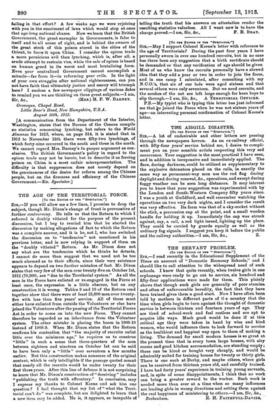THE AGE OF THE TERRITORIAL FORCE.
[To THE EDITOR Or THE " SPRCTATOR."] Sut,—If you will allow me a few lines, I promise to drop the subject, though Mr. Dixon's change of front is provocative of further controversy. He tells us that the Return to which I referred is doubly vitiated for the purpose of the present discussion, but I beg to remind him that he started the discussion by making allegations of fact to which the Return was a complete answer, and it is he, not I, who has switched the discussion on to "tendencies" not mentioned in his previous letter, and is now relying in support of them on the "doubly vitiated" Return. As Mr. Dixon does not say what are the tendencies which he thinks he detects, I cannot do more than suggest that we need not be too much alarmed as to their effects, since their very existence appears to depend on two further mistakes of fact. Mr. Dixon states that very few of the men over twenty-five on October 1st, 1912 (70,300), are "due to the Territorial system." As all the men in the Force have enlisted or re-engaged in the Force at least once, the expression is a little obscure, but on any construction it is wrong. Tables 9 and 10 of the Return read together show that there were at least 25,800 men over twenty- five with less than five years' service. All of these must either have enlisted from outside the Volunteers or else have joined the Volunteers after the passing of the Territorial Forces Act in order to come on into the new Force. They cannot therefore be regarded as an inheritance from the Volunteer system. The other mistake is placing the boom in 1909-10 instead of 1908-9. When Mr. Dixon states that the Return confirms his contention that "the majority of recruits enlist little over the minimum age," he requires us to construe "little" in such a sense that three-quarters of the men between eighteen and nineteen on October 1st can be said to have been only a " little " over seventeen a few months earlier. But this construction makes nonsense of the original context, which is only intelligible if the passage quoted meant that nearly all the recruits would be under twenty for their first three years. After this line of defence it is not surprising to learn that Mr. Dixon's construction of" deceiving" includes "publishing the truth with effrontery." In conclusion, may I express my thanks to Colonel Keene and ask him one question ? I had thought that my list of" what the Terri- torial can't do" was complete, but am delighted to learn that a new item may be added. He is, it appears, so incapable of telling the truth that his answers on attestation render the resulting statistics valueless. All I want now is to have the charge proved.—I am, Sir, &c., F. E. BRAY.










































 Previous page
Previous page